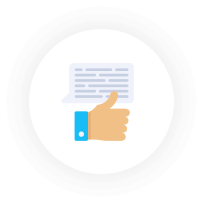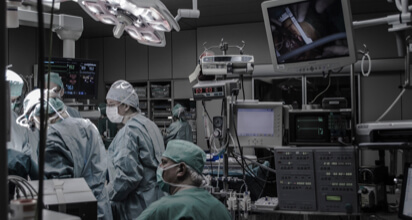How to protect patient information in the age of data breaches?
With growing use of open healthcare software platforms, patient data breaches have increased. Find out how this can be prevented.
Healthcare data is every hacker’s prized catch. That’s because this data contains social security numbers and home addresses of patients. This information has a lot of value to many companies trying to sell products as well to other hackers interested in making unauthorized digital transactions. It’s alarming how many healthcare providers choose inexpensive cloud-based apps with little security controls over custom healthcare software solutions that define and provide user controls.
In the first quarter of 2017, Protenus published a report that counted incidents of 233 patient data breaches to the Department of Health and Human services of USA. The number of patient records affected in 2017 surpassed 3.1 million in the country. Cybersecurity insurer, Beazley Group, noted that it saw a 133% increase in ransomware attacks among its healthcare clients in 2017 compared to the first half of 2016. In fact, Accenture reported that more than 25 million people worldwide will have their medical and/or personal information stolen from their healthcare provider’s digitized records by 2019.
Take a look at some of the world’s biggest healthcare breaches in 2017 –

How do breaches happen in patient data?
It’s obvious that large and small clinics, hospital chains and even radiology centers are now managing their data online. Unless there are enough security controls and protected cloud storage, it becomes easier for hackers to make their way through their systems. A lot of such breaches are rooted in management of the workforce. However, most of these breaches happen due to human errors, carelessness or frauds. Here’s how the breaches may happen –
# 1. Access to username and passwords
Many times, doctors and surgeons completely trust co-workers or staff to the extent that they easily provide their username and passwords for either faster task management or inability to finish tasks themselves. This enables some employees, who were originally not meant to access this information, to see or access patient records.
# 2. Unauthorized cloud-based apps
Sometimes healthcare workers use unauthorized cloud-based apps that give them access to health information.
# 3. Theft due to carelessness
A storage facility that was left unlocked had backup disks that were later lost or stolen.
# 4. Excel spreadsheets
It’s very easy to copy patient data or protected health information that is stored in Excel sheets.
# 5. Server hacks
An individual or group hacks a healthcare facility’s server that results in misappropriation of records – past or current.
If you look closely at all these reasons, you will see that human carelessness tops the real reason for any patient data breaches. A 2017 study conducted by Beazley Breach Response Services reveals that of all the patient data breaches –

What are the best ways to protect patient information?
It is the responsibility of healthcare providers such as hospitals, clinics, doctors, and doctorpreneurs to ensure that patient data is protected at all times without exception. Some of the most effective ways to protect patient information are –
25 million+ people will have their medical and/or personal information stolen from their healthcare provider’s digitized records by 2019.
# 1 Opt for custom healthcare software solutions
It’s now crucial for healthcare providers to become choosy about their software development partners. They should always opt for custom healthcare software solutions that provide the freedom to choose user controls and define data security norms. Some of the most secured healthcare software solutions are HIPPA compliant and have interoperability with enough user controls.
# 2. Create a user access mechanism
Ask your software solution partner to create a security mechanism where user access, controls, and admin controls are pre-defined. As a result, the software will automatically block access to anyone who’s not authorized to visit certain sections of application or access certain data on the platform. The app should insist on strong passwords, PIN numbers that limit the access of information within the facility. The number of system access points should be greatly reduced.
# 3. Data encryption
Another effective way to better healthcare workforce management is to have a facility of data encryption on a healthcare software. This means information cannot be read or understood by anyone except by people who have the encryption key.
# 4. Security training of all personnel
Doctors and members of the staff must be trained and made aware of the possibility of data breaches in case they shared their username and passwords to fellow workers. The workforce should be educated about management of patient data keeping security threats in mind. Employees should be aware of never clicking on any link that they think looks suspicious. Warning signs can be placed at workstations so everyone is alert at all times.
Apart from interoperability, a trustworthy healthcare solution is HIPAA-compliant. A lot of this depends on the custom healthcare software provider who you choose to partner with. Vinfotech has been creating HIPAA and HL7-compliant applications successfully for over a decade now. The platforms that we created have had a great track record of data security and have been recognized globally. We have created several EMR and telehealth applications so we know the importance of patient data and its security. If you need to create a fully secured and custom healthcare software solution, give us a call.
- Opt for custom healthcare software solutions
- Create a user access mechanism
- Data encryption
- Security training of all personnel
About Vinfotech
Whether you are looking out to build a chatbot on top of your telehealth app as a smart symptom tracker, or take charge of improving overall healthcare experience of your hospital by connecting your staff, doctors and patients over a gamified online community integrated with various fitness wearables and medical devices, turn to Vinfotech.
Vinfotech is design-led healthcare ecosystem software provider for governments, healthcare organizations, care providers, medical ISVs, device manufacturers and software product companies with following expertise:
/ Healthcare online communities (for patients, hospitals & donors)
/ Telehealth
/ E-prescription
/ EMR
/ Coordinated care solutions
/ Chatbot, medical device and wearable integration
/ Any custom web/ mobile app















